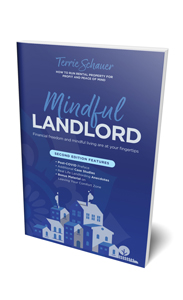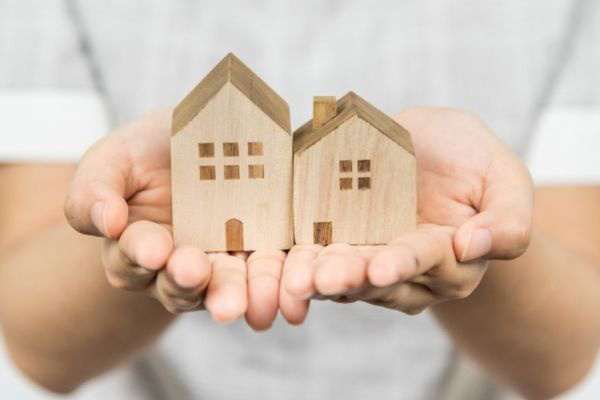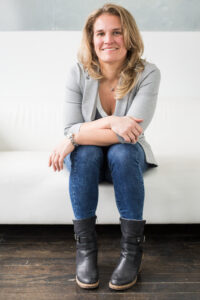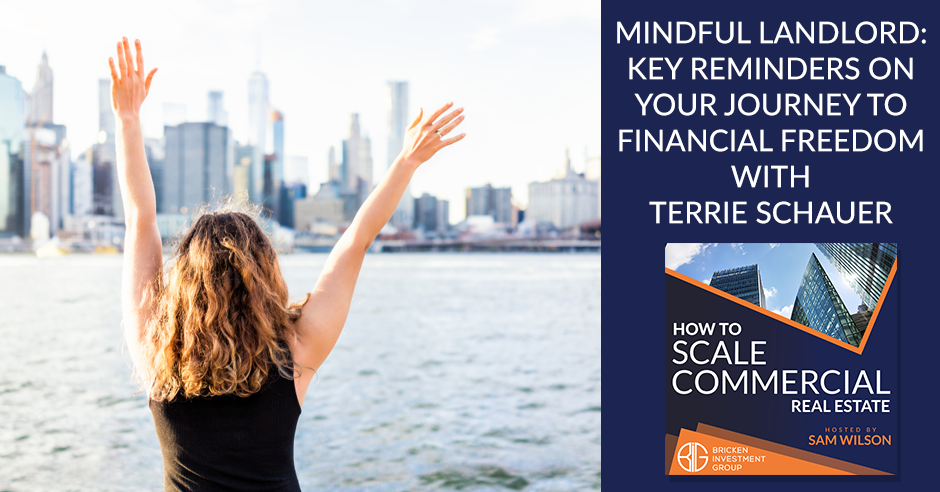Most people get into real estate with the aim of financial freedom. But it’s important not to lose sight of the why behind your goals and not get sucked into simply getting more dollars. In this episode, Terrie Schauer gives important reminders on how to stay on track in the path to financial freedom. Terrie is a real estate investor, coach, and broker. She is the host of The Mindful Wealth Podcast and the author of Mindful Landlord: Financial freedom and mindful living are at your fingertips. She offers valuable advice on keeping that balance in your life both financially and personally. Financial freedom cannot be achieved in a vacuum. Join in on her chat with host Sam Wilson to learn more.
—
Watch the episode here:
Listen to the podcast here:
Mindful Landlord: Key Reminders On Your Journey To Financial Freedom With Terrie Schauer
Terrie Schauer is an active investor, property manager, and author of the book, Mindful Landlord. She invested in multifamily in Montreal, Canada, and cohost two podcasts, one on Real Estate and the other called Mindful Wealth.
—
Terrie, welcome to the show.
Thanks for having me.
The pleasure is mine. The same three questions I ask everyone who comes to the show. Can you briefly tell us where did you start, where you are now, and how did you get there?
I started managing properties when I was nineteen years old. I moved out of my parents’ house and went away to college. When I moved to Toronto, there was no space in the student residence. I ended up in this crazy student house that was poorly managed, and they voted me as house manager the day after I moved there.
I found myself managing this Victorian mansion of a bunch of college kids. It turned out I liked that so much that I decided that when I moved cities, I would set up the same thing. I rented another big house and decided, “I’m going to now do this for myself.” I like living in that kind of community and it was a way to cut fees. It is like house hacking.
I moved back to Montreal after I had finished studying. I went to see my dad and I said, “Dad, I have been doing this now for about five years as a tenant. Would you lend me a down payment?” I had an up-and-coming area in view. We closed on the property and I set up a student community there and then things grew from there. It was such a good business model that I ended up packaging it and selling it to other people.
What was the a-ha moment or the thing that you said, “I’m onto something here?”
Real estate is great, but it’s also dangerous to get caught up in that kind of bigger is better mentality.
I studied for a long time. I was doing property management as a sideline to an academic career. I finished my PhD when I was 30 and decided, “I’m not going to be an academic.” There was this crisis moment when I was like, “I enjoy real estate more but I’ve invested ten years into building a career as an academic, but that is not where I see myself.” I thought, “What am I going to do to succeed in that area because I didn’t have training.”
I had experience on the ground, but I didn’t have any formal training. I decided to get a job in a property management company and did that for a couple of years with the idea that I was going to one day start my own firm. I wanted to get paid to see how to set myself up, clone what they did and haven’t looked back since.
What does the business look like for you now?
I also had another pivotal moment several years ago, where I had tried to scale the management business. I have my broker’s license and I tried to grow my brokering business. I realized that while I was having success from that work, it was not giving me the return that I wanted in my personal life. I became a mom and realized that it is not all about more dollars and more doors and bigger is better.
That was my mindful landlord moment when I realized real estate is great, but it is also dangerous to get caught up in that bigger is better mentality. That turned into me writing the book and doing more joint venture deals. The skills I had built as a property manager were able to get way more bang for my buck as an investor than managing properties for other people. That is in the latest rotation of the wheel thing.
You were doing property management, moved out of it and more into landlord and ownership versus property management. Do you still manage your own properties?
I built a management team in Montreal and we were quite effective in a sense. That is a bit of my secret sauce. Most investors have an angle. Some of them are going to be very good at construction and creative financing. It turned out that my secret sauce was the management aspect. Rather than close the business, I decided I’m going to slowly get rid of some of my clients, not aggressively take on new business and I want those doors to be my doors or doors that I have joint ventures with as opposed to being managing for other people. Part of the portfolio is still owned by other people, but I’m not one out my building in and one out another building of mine in.

Mindful Landlord: Financial freedom and mindful living are at your fingertips (Second Edition)
Talk about the property management side of things. Talk to us about some of the things that you see that people are doing right and wrong. How is it that you guys creatively solve some of the problems that maybe people find in managing their own properties?
One of the things that I observe in terms of mistakes that I see people make a lot is not understanding the legal side of things. I live in the French part of Canada, which is Quebec. We were probably closest to New York or California. Everything here is rent-controlled. We have a strong tenant board. There are a lot of laws in terms of what you can and can’t do. I feel like there is also a lot of talks that are not true.
A lot of landlords don’t know what their rights and obligations are. They will make decisions that are not based on legal best practices, like, for example, evictions. Everyone is like, “Eviction is such a big deal. Rent non-payment.” It is not. If I have an issue, I want the police. Non-payment is the easiest issue to police versus them having twelve dogs, growing pot on the property or something like that. It is all way more complicated. One thing is to understand the legal environment properly.
The other thing is also understanding that property ownership is a business. When you make decisions, it is important not to make emotional decisions. Let’s say I want to have this beautiful kitchen. I walk into a unit and I’m like, “Let me renovate this as a function of the fact that I would live there.” No, it has to be in line with whatever your client market is. It doesn’t mean you can’t make beautiful units if the market is willing to support that, but you have to approach every decision as a business decision. If I’m going to write this check, what is the ROI on that going to be? It is to be super technical and scientific about it and not make emotional decisions.
That sounds like something that a newer landlord would run into more on the emotional decision, over renovating or things like that. Maybe more than someone had experienced. The other part of that equation is landlords don’t take care of their property.
As people become more experienced and they get a bit caught up in the more dollars and more doors is they neglect the basic things that are going to keep their investment taking over. That is another aspect of emotional decision-making because, in a sense, you are taking the short-term over the long-term stability of whatever you are trying to do. That short-termism is also a question of myopic analysis of what is going on.
Talk to us about the book you have got there, the Mindful Landlord. What is that about and give us some highlights on that?
Approach every decision as a business decision.
I mentioned that when I became a mom, it forced me to rethink what I was doing in my business life. It is my attempt to marry some of the holistic, philosophical issues that I have faced as an investor with nuts and bolts like, “You want to get into the business, you need to do 1, 2, 3, 4, but while you are doing that, don’t lose sight of the forest for the tree that is in front of you.”
When you are starting, people face a lot of mental roadblocks in terms of fear or limiting beliefs that stop them from getting started. A lot of people talk about that but there is also this time when you start to see success. That is a moment when a lot of them experienced investors get caught up in this wheel of more doors and more dollars.
I went down that hard road myself. At the beginning, getting into real estate is to quit your job and have a better quality of life. If you get on another hamster wheel, you haven’t figured out the solution to the equation. The equation is financial freedom. The word freedom is in there. It is not just about finances. It is also about freeing yourself from some of those perseverating mental things that keep you trapped.
I have never heard that financial freedom is part of the equation. On that, you said you wanted to write about holistic and philosophical things as it pertains to real estate. What does that mean?
I’m talking about mentally how do you need to set yourself up to have a fulfilling life in addition to being an investor? If that is, a lot of the limiting beliefs happen to be things that keep people at whatever level of attainment that they have. You either believe you are too shy or afraid to take risks. Most of us got over that initial hurdle. We all had to go through that process when we started investing.
The other part is once you start succeeding, what do you do in the service of more, and why are we driven by more? When I say philosophical, it gets into a bit of looking at our culture and the way in which we were pushed to consumption, win the bank account Olympics and look at that and evaluate what real joy is bringing me in my everyday life? If I’m going to go and buy myself a $3 million to $4 million house, what pressure am I putting on myself to maintain that lifestyle versus I live in a fairly modest house and neighborhood with some chickens in the backyard? That is a quality of life decision that you make in terms of how you want to run your stuff.
That ties right back in with the freedom idea where you are talking about financial freedom. What does that mean to you? At what point in time did you say, “I have achieved the freedom I want.” Is that a constant work in progress?

Financial Freedom: Understand that property ownership is a business. When you make decisions, it’s very important not to make emotional decisions.
One thing is handling the financial side of it. What I like to say also is that I was able to cover my living expenses with nine doors. I had a good business model and I got into the market at a good time in order for that to happen. I want to dispel this myth that you need thousands of properties to be financially free because the technical definition of financial freedom is when your income covers your living expenses. Yes, you can work on your passive income, but you can also work on living a lifestyle that is going to allow you to reach that goal earlier. That is one thing.
The other aspect is to get aligned and understand what it is that brings you joy and happiness and then how to do that. One of the things that don’t get talked about is how to do that in a way that is not socially disruptive. I don’t know exactly where you are investing, but in Montreal, there are a lot of optimizing, gentrifying, and practices that are a little bit dodgy in terms of what landlords do. Housing is a big issue in terms of cycles of poverty and all that other stuff.
When you do a gut check of what effect are my actions is having in the world, I don’t think you can truly be at peace unless you are aware of the result of behaviors that you have and then you go through this audit where you are like, “If everybody made this decision, what would the world look like?” That needs to be a part of if you want to set yourself up to have the financial stuff taken care of, but also peace of mind. You are not doing that in a vacuum. You are doing that in a community and spiritual space, for lack of a better take on it.
Terrie, can you talk to us a little bit about your podcast, Mindful Wealth, what it is about and maybe how readers can get in touch with you on that side?
We have a website, MindfulWealthPodcast.com, but that is exactly what I was outlining that I got together with a financial planner from California, Jonathan DeYoe. Both of us were a little bit fed up with our industries. He comes from more of the stock side and I come from real estate. Both of us were set up with the greed culture or the bigger is a better culture of our respective industries. We wanted to ask those difficult questions, which people on our side of the table tend not to ask so much.
What is the real key to happiness? Is it more money? Is there a time at which money tapers off and other things become more important? How do we pursue wealth in a socially responsible way? If it is an I win and you lose situation, ultimately, you are not winning. When you are on your death bed, you are not going to be thinking, “I had the biggest bank account, and therefore, I won the game of life.” No, that is not what you are going to remember at the end. That podcast gets into some of those issues.
Lastly, talk to us about the second edition of your book that is coming out here in February 2022.
It’s better to take action and make mistakes than not take action.
I’m excited to re-releasing of that. I went back to the drawing board a little bit after having the COVID-19 experience. That forced us to all pause a little bit and rethink some things. Also, to go back and after having started, the Mindful Wealth Podcast has been running since 2020. Some of the interviews that we did there forced me to rethink some stuff.
One of the great things about the way the world works now is you can go in and choose, “I didn’t like this. Let me re-edit it and put out the new, improved version of it.” That ended up being the decision to release that. I’m getting that in February 2022 to include some of that new information that I think is going to be interesting for people.
This has been a great interview. Thanks for taking the time to come to the show. Let’s jump here into the final four questions. What is one resource that you can’t live without?
My eReader. I’m on there all the time.
Question number two, if you could help our readers avoid one mistake in real estate, what would it be, and how would you avoid it?
I will pick two and they would be the ones that I said before. One of them would be, if you haven’t got started, just do it. You are better to take action and make mistakes than not take action. The other one is for people who are a bit further along the line is when you find yourself on a little hamster wheel, think about the hamster wheel. Don’t run after bigger is better because that is not ultimately the key to happiness.
When it comes to investing in the world, what is one thing you are doing right now to make the world a better place?

Financial Freedom: If you want to set yourself up to have the financial stuff taken care of but also peace of mind, you’re not doing that in a vacuum. You’re doing that in a community. You’re doing that in a spiritual space.
The book and the podcasts are my attempt to bring some reflective ideas to help people who are in financial services or real estate contemplate what the effects are of their decisions.
If our readers want to get in touch with you, what is the best way to do that?
In social media, you got my name. You can find me on Instagram, Facebook, and LinkedIn. MindfulLandlord.com and TerrieSchauer.com are my websites.
Terrie, thanks so much for your time. I do appreciate it.
Thank you, Sam.
Important Links:
- Terrie Schauer
- Mindful Landlord
- Real Estate – Real Estate Investor’s Club Podcast
- Mindful Wealth – Mindful Wealth Podcast
- Instagram – Terrie Schauer
- Facebook – Terrie Schauer
- LinkedIn – Terrie Schauer
About Terrie Schauer
 Terrie is an active investor, property manager and author of the book Mindful Landlord. Terrie invests in multi-family in Montreal, Canada. She co-hosts two podcasts, one on Real Estate and the other called Mindful Wealth.
Terrie is an active investor, property manager and author of the book Mindful Landlord. Terrie invests in multi-family in Montreal, Canada. She co-hosts two podcasts, one on Real Estate and the other called Mindful Wealth.




0 Comments